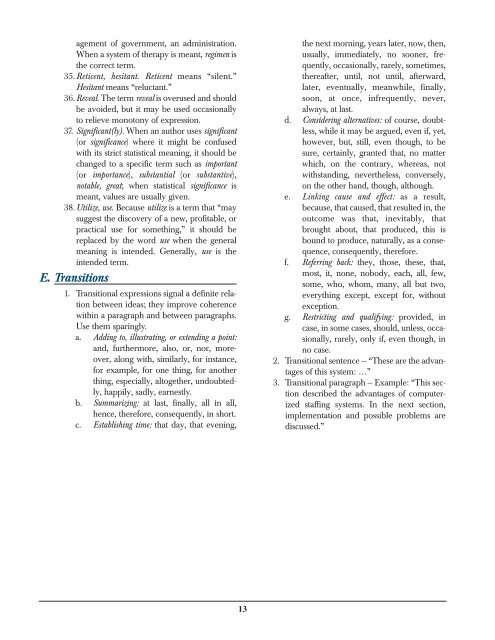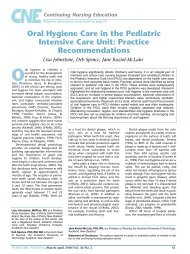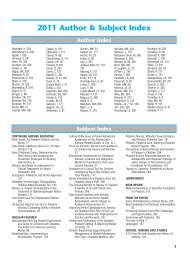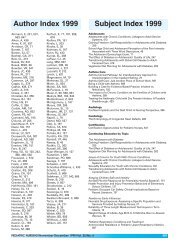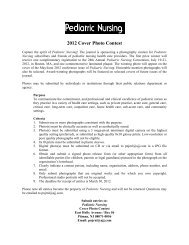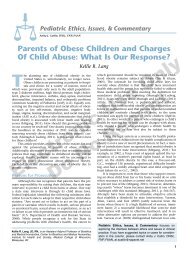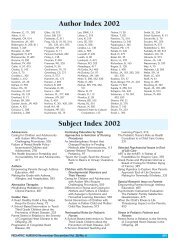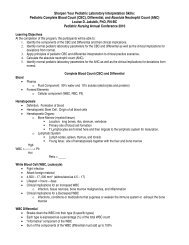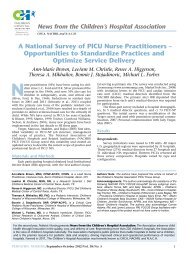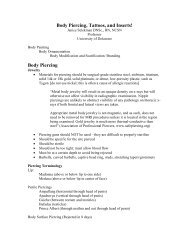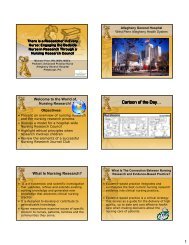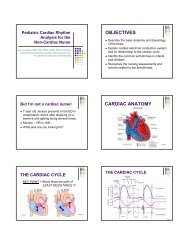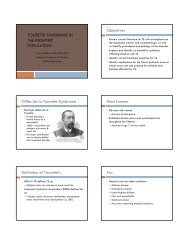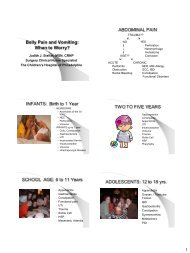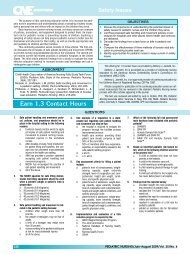Jannetti Publications Guidelines For Authors - Pediatric Nursing
Jannetti Publications Guidelines For Authors - Pediatric Nursing
Jannetti Publications Guidelines For Authors - Pediatric Nursing
Create successful ePaper yourself
Turn your PDF publications into a flip-book with our unique Google optimized e-Paper software.
agement of government, an administration.<br />
When a system of therapy is meant, regimen is<br />
the correct term.<br />
35.Reticent, hesitant. Reticent means “silent.”<br />
Hesitant means “reluctant.”<br />
36.Reveal. The term reveal is overused and should<br />
be avoided, but it may be used occasionally<br />
to relieve monotony of expression.<br />
37. Significant(ly). When an author uses significant<br />
(or significance) where it might be confused<br />
with its strict statistical meaning, it should be<br />
changed to a specific term such as important<br />
(or importance), substantial (or substantive),<br />
notable, great; when statistical significance is<br />
meant, values are usually given.<br />
38.Utilize, use. Because utilize is a term that “may<br />
suggest the discovery of a new, profitable, or<br />
practical use for something,” it should be<br />
replaced by the word use when the general<br />
meaning is intended. Generally, use is the<br />
intended term.<br />
E. Transitions<br />
1. Transitional expressions signal a definite relation<br />
between ideas; they improve coherence<br />
within a paragraph and between paragraphs.<br />
Use them sparingly.<br />
a. Adding to, illustrating, or extending a point:<br />
and, furthermore, also, or, nor, moreover,<br />
along with, similarly, for instance,<br />
for example, for one thing, for another<br />
thing, especially, altogether, undoubtedly,<br />
happily, sadly, earnestly.<br />
b. Summarizing: at last, finally, all in all,<br />
hence, therefore, consequently, in short.<br />
c. Establishing time: that day, that evening,<br />
the next morning, years later, now, then,<br />
usually, immediately, no sooner, frequently,<br />
occasionally, rarely, sometimes,<br />
thereafter, until, not until, afterward,<br />
later, eventually, meanwhile, finally,<br />
soon, at once, infrequently, never,<br />
always, at last.<br />
d. Considering alternatives: of course, doubtless,<br />
while it may be argued, even if, yet,<br />
however, but, still, even though, to be<br />
sure, certainly, granted that, no matter<br />
which, on the contrary, whereas, not<br />
withstanding, nevertheless, conversely,<br />
on the other hand, though, although.<br />
e. Linking cause and effect: as a result,<br />
because, that caused, that resulted in, the<br />
outcome was that, inevitably, that<br />
brought about, that produced, this is<br />
bound to produce, naturally, as a consequence,<br />
consequently, therefore.<br />
f. Referring back: they, those, these, that,<br />
most, it, none, nobody, each, all, few,<br />
some, who, whom, many, all but two,<br />
everything except, except for, without<br />
exception.<br />
g. Restricting and qualifying: provided, in<br />
case, in some cases, should, unless, occasionally,<br />
rarely, only if, even though, in<br />
no case.<br />
2. Transitional sentence — “These are the advantages<br />
of this system: …”<br />
3. Transitional paragraph — Example: “This section<br />
described the advantages of computerized<br />
staffing systems. In the next section,<br />
implementation and possible problems are<br />
discussed.”<br />
13


